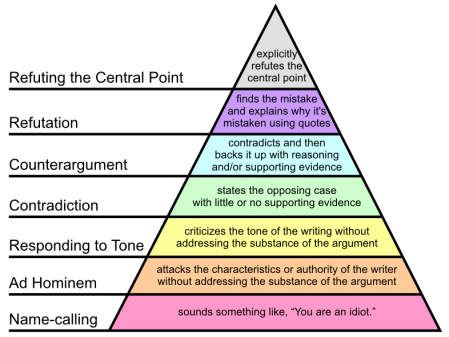This guide, from a longtime commenter on Megan McArdle’s blog, does an excellent, if cynical, job of explaining how to win an online argument. It includes:
- Using allusions to make you look smarter (Wikipedia is a great resource for finding quick facts).
- Treating stupid questions as if they are serious (this one could actually help the conversation).
- Treating serious questions as though they’re stupid (great way to score points, but do not contribute to a good discussion).
- Admitting any and all faults you are accused of (this diffuses the bottom two argument styles in Graham’s hierarchy: name-calling and ad-hominem attacks.)
- Asking earnest questions instead of making arguments (which can be very useful in pointing out the complexities of a situation.)
- Never pulling rank. Let your credibility (ethos) be based on what your argue, not on how much education/training/experience you have (credibility is important, and so is experience, but pulling rank tends to annoy people and that will loose you friends.)
- Being brief (snappy one-liners may not have the depth of a well reasoned argument but are more likely to win friends).
Most of these techniques are appeals to the emotions (pathos). They can, and may sometimes need to, be used to support a good, well reasoned, argument (logos).
[B]efore some audiences not even the possession of the exactest knowledge will make it easy for what we say to produce conviction. – Aristotle in On Rhetoric
Be careful how you use these things, and watch out for them, because they don’t only occur online, you’ll see them often in any conversation.

